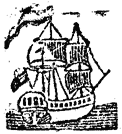 Robert Patterson was a sailor. Since Boston was the third largest port in North America, there were many sailors in town over the winter of 1769-1770. But Patterson stood out by standing on the front line of riotous crowds.
Robert Patterson was a sailor. Since Boston was the third largest port in North America, there were many sailors in town over the winter of 1769-1770. But Patterson stood out by standing on the front line of riotous crowds.On 22 Feb 1770, a mob of boys attacked Customs official Ebenezer Richardson’s house after he tried to break up their anti-importer demonstration. Richardson fired a musket-full of birdshot down at the crowd. Some of those pellets cut Patterson’s pants. (As a sailor, he wore baggy shin-length trousers rather than closely fitted leather or cloth breeches.) Patterson must therefore have been standing close to Christopher Seider and Samuel Gore, the two boys wounded (one fatally) by Richardson’s shot.
Judicial authorities made Patterson agree to a £50 bond to ensure he’d be available to testify against Richardson. They may have thought that necessary because the sailor wasn’t a legal inhabitant of the town and might have gone to sea at any time. We don’t have complete records for that trial, but notes kept by special prosecutor Robert Treat Paine summarize Patterson’s testimony this way:
I went up to R[ichardson], and I saw R fire the Gun, from within the House. The Boy fell. The Shot went thro’ my Trowsers.One might think that such a close call would have prompted Patterson to stay home quietly the next time there was trouble. But no. Here’s what he did on the night of 5 March, in his own words:
I, Robert Patterson, of lawful age, testify and say, that on Monday night, the 5th current, being at Capt. [Hector] McNeill’s at the North End, heard the bells ring and “Fire!” cried.Patterson signed this deposition with his mark; perhaps his right arm was disabled, or perhaps he never could sign his name. Dr. Elisha Story attested to that mark, so he might have been caring for the sailor. Then again, Story might have been on the scene to help his father-in-law, Justice of the Peace John Ruddock, take the deposition.
I immediately ran till I got into Royal Exchange lane, it being about a quarter after 9 o’clock. I saw a number of people in the lane. I asked what was the matter? They told me that the soldiers were going to kill all the inhabitants.
I immediately went through the lane, and stood in the middle of King street about ten or eleven minutes (the sentinel [Pvt. Hugh White] then standing leaning against his box), when I saw an officer [Capt. Thomas Preston] with seven or eight soldiers coming from the main-guard, clearing the way with their guns and bayonets, go below the sentinel box, and turn up and place themselves around it, facing the people standing opposite Royal Exchange lane; when I saw a man with a light colored surtout at the Custom-house door, the door being wide open, there standing with his shoulder against the side; then I heard the officer order the soldiers to load, which they did. After that I heard the people say, “Damn you, why don’t you fire?”
In about a minute after I heard the word “Fire!” (but from whom I cannot say) which the soldiers did. Looking round I saw three men lay dead on the snow; the snow being at that time near a foot deep.
Immediately they loaded again. The people then gave three cheers, and cried out, “Let’s go in upon them, and prevent their firing again;” upon which they put on their hats and advanced towards them. My hand being raised to put on my hat, still advancing towards the soldiers, the sentinel up with his gun and fired, the balls going through my lower right arm, my hand immediately falling; and finding myself wounded, made the best of my way home with help.
The historical consensus is that there were not two volleys of shots from the soldiers as Patterson described; instead, the Boston Massacre resulted from an irregular series of shots. Though the soldiers reloaded, they didn’t fire a second time. There’s also no corroboration for Patterson’s recollection of a civilian in the Customs house doorway at the time of the shooting—a detail that would have implicated royal revenue officials in the incident. Paine didn’t call Patterson to testify at the soldiers’ trial, and Pvt. White was ultimately acquitted.
TOMORROW: What the future held for Robert Patterson.
No comments:
Post a Comment